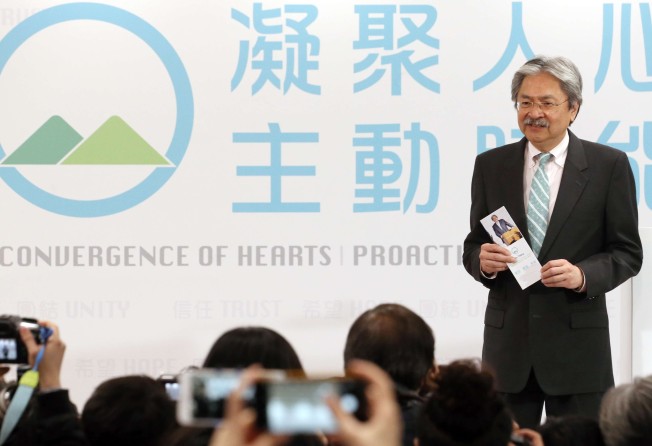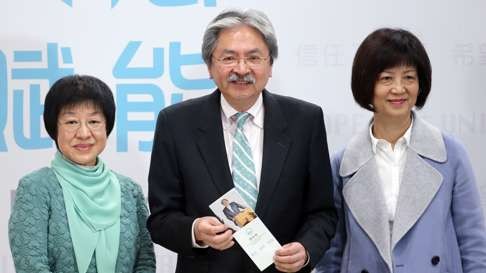John Tsang pledges to reboot Hong Kong political reform debate
Launching his manifesto, former financial secretary also vows to revisit national security bill which saw half a million take to streets in 2003

Chief executive contender John Tsang Chun-wah on Monday walked the fine line of trying to appeal to both pan-democrats and Beijing by promising to restart the political reform process and revisit a controversial national security bill if he were elected.
The former financial secretary also called for a review to look into introducing a two-tier progressive profits tax to lessen the burden on small- and medium-sized enterprises and a negative income tax that would help low-income groups.
Watch: John Tsang pledges to revisit national security bill Article 23
Tsang gave a no-frills press conference at Tsim Sha Tsui’s YMCA Building to unveil his manifesto, with no special guests in contrast to arch-rival Carrie Lam Cheng Yuet-ngor’s star-studded rally at the Hong Kong Convention and Exhibition Centre last week.
Lam launched her Facebook page soon after Tsang’s conference had ended.
The thorny issues of political reform and national security law top Tsang’s 73-page manifesto, themed “proactive enablement”.
The issue of universal suffrage “must be resolved”, Tsang said, and if he became the city’s leader as he could ensure enhanced communication with all sectors.
“We believe we can reach consensus, and I shall convey it to the central government,” he said. “I believe the central government will make an accurate judgment.”
The stringent rules to reform the chief executive election, handed down by Beijing on August 31, 2014, would still form the “basis”, but Tsang said he would “accurately” reflect Hongkongers’ wish to scrap the framework. The August 31 scheme, rejected by the pan-democrats, would effectively allow a 1,200-member nominating committee to vet and pre-approve candidates before Hongkongers can vote for them.
Tsang said he would get the bill ready as soon as possible – before the legislature was re-elected in 2020.
But equally urgent, Tsang said, was the constitutional duty to enact legislation to protect national security under Article 23 of the Basic Law. The government was forced to abort its passage in 2003 after 500,000 protested against it. He said he would learn from past mistakes and publish a “white bill” to enable extensive public consultation and amendments. A committee led by a legal authority would draft the bill, starting with less controversial issues.
But another leadership contender, former security chief Regina Ip Lau Suk-yee, who failed to push through a national security law in 2003, was sceptical, as all seven offences in Article 23, such as treason and sedition, were sensitive. Asked which of the two – political reform or Article 23 – was the priority, Tsang replied both would “start together”.
Time is tight ... when the Legislative Council is re-elected in 2020, there will be greater uncertainty
“Time is tight – we have a little more than two years,” he said. “When the Legislative Council is re-elected in 2020, there will be greater uncertainty.”
Other highlights included the tax review to allow smaller firms a lower profits tax rate rather than the flat rate of 16.5 per cent and abolition of the high-pressure Territory-wide System Assessment for primary school pupils.
Ma Ngok, a political scientist at Chinese University of Hong Kong, said Tsang had deftly pre-empted Lam, whose manifesto will be out in March.
But last night, her office fired back, saying she had brought up the progressive profits tax idea in her recent meeting with the business sector and this demand was rejected in previous budgets – presumably by Tsang. Similarly, she hinted he blocked negative income tax in the past. This was why she opted for other subsidies for low-income groups.
